
Become a member
Join today and help protect nature, beauty and history – for everyone, for ever. Enjoy access to more than 500 places with National Trust membership.
A 1,600-acre estate with elegant gardens, Edwardian house and plenty of room to play
Great Bookham, near Dorking, Surrey, RH5 6BD
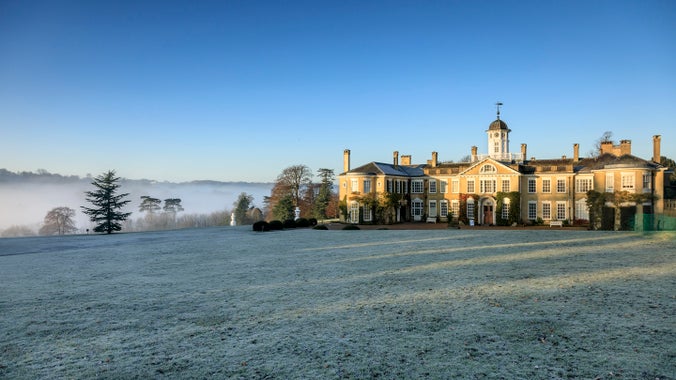
| M | T | W | T | F | S | S |
|---|---|---|---|---|---|---|
Open
Closed
| Asset | Opening time |
|---|---|
| House | 11:00 - 15:30 |
| Car Park | 07:30 - 18:00 |
| Coffee shop | 10:00 - 17:00 |
| Garden | 10:00 - 17:00 |
| Café | 10:00 - 16:45 |
| Shop | 10:00 - 17:00 |
| Kiosk | Opening times vary |
| Bookshop | 10:30 - 16:00 |
Just the ground floor of the house will be open for 2026; there is no exhibition this year. Please note that hot food is served in the cafe between 12pm and 3pm.
| Ticket type | With Gift Aid | Without Gift Aid |
|---|---|---|
| Adult (18+) | £19.80 | £18.00 |
| Child (5-17) under 5s free | £9.90 | £9.00 |
| Family (2 Adults and up to 3 children) | £49.50 | £45.00 |
| 1 adult, 2 children | £29.70 | £27.00 |
Assistance dogs are allowed in formal gardens, house, café and second-hand bookshop.
You'll find the volunteer-led second-hand bookshop in a secluded corner on the west side of the mansion. If you have any books that you would like to donate, please get in touch. Speak to a volunteer in the bookshop or give us a ring on 01372 452048.
In the café, situated within the Stable Courtyard, you'll find a variety of hot and cold options. We also have a range of delicious cakes and classic cream teas. There are plenty of indoor tables, as well as an outdoor seating area. Hot food is served in the cafe between 12pm and 3pm.
Plenty of parking available. Main car park is hard-standing and two overflow car parks are grass. Please obtain car parking ticket. National Trust members park for free. Non-members £5 per day. Download the JustPark app before your visit to register and pay. Use machines to scan membership cards or pay by cash. You can also pay by card at Visitor Reception.
As you arrive from the main car park, you'll see the coffee shop, a great place to buy hot and cold drinks, cakes and snacks to take away. Dogs are welcome in the coffee shop and there are seats both inside and outside. Opening times vary.
Well-behaved dogs on leads are welcome within selected areas inside the main grounds. Please pick up a dog walking map at visitor reception. Routes to the formal gardens are signposted assistance dogs only. On the wider estate, well-controlled dogs are welcome off lead, but please keep them on a lead around livestock and on a short lead around sheep.
Dogs allowed - more informationTen electric vehicle charging outlets available in the main car park. Chargers can be accessed via mobile app, RFID card or contactless payment device. Visit our EV charging partner, RAW Charging's website (www.rawcharging.com/drivers) to download the app before your visit. Chargers only available during property opening hours. User helpline: 020 7519 5052.
Volunteer-led short house tours are available on selected days. Please ask at Reception which tours are available today.
At the Beech Hut kiosk you'll find hot and cold drinks, as well as snacks and cakes, located in the middle of the pleasure grounds. Opening days and times vary.
You’ll find the gift shop in the Stable Courtyard, selling a range of gifts, local products, plants and garden accessories.
Main toilet block available near the car park, which has an accessible toilet and baby change facilities. The café has a smaller toilet block with unisex toilets, baby changing facilities and a larger changing area.
Blue Badge parking and drop off point. Accessible toilets. Grounds partly accessible. Courtesy shuttle service (subject to volunteer availability). Mobility scooters and wheelchairs available.
Accessible routes available through the pleasure grounds and formal gardens. Ground floor of house is wheelchair accessible. Please see the following link for more information.
Accessible route and/or map - more informationAccessible toilets available both in main toilet block and small toilet block next to the café. There is an adult-sized, height-adjustable changing table in the accessible toilet next to the café.
A braille guide for the gardens, estate and house showrooms is available. Ask at Reception for more information.
Blue badge parking on the left as you head towards the car park. The opposite side is prioritised for visitors with mobility issues who may not have a blue badge.
Drop-off point available to the left as you approach the car park, just outside the coffee shop.
Available in coffee shop, café, shop, and visitor reception.
Coffee shop and café have level access, the Beech Hut kiosk is in a level, outdoor area with woodchip covering.
Level access to main retail shop, second-hand bookshop has two small ramps for access.
There are some uneven paths in the pleasure grounds, rose garden and old kitchen garden.
Mobility scooters are available, but we recommend pre-booking these by calling ahead of your visit or emailing polesden.reception@nationaltrust.org.uk to ensure availability.
Main access route to the house is along a slope. Alternative route is available. Ramped access to second-hand bookshop and house.
Coffee shop has picnic benches with tables that can accommodate a wheelchair.
Steps are scattered throughout the gardens but are marked on maps. Some areas have uneven terrain, especially in the pleasure grounds and old kitchen garden.
A volunteer-led accessibility bus is available but may not run every day. Please call ahead to confirm availability.
Outdoor wheelchairs are available to borrow from visitor reception. To ensure availability please book ahead.
Are you looking for a special day out? Find out about upcoming events here. Whether you fancy some family fun in the grounds or are looking for something different to do with friends, there's something for everyone to enjoy.

Download a map of Polesden Lacey showing the location of the house, facilities and garden highlights to help you find your way around. You can also collect a copy from Visitor Reception on arrival.
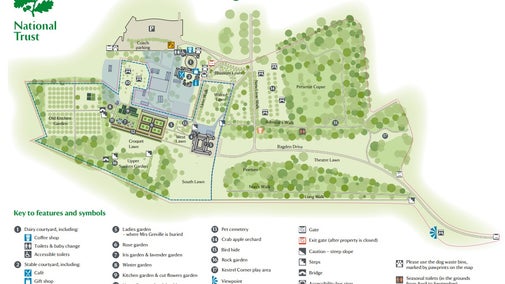
Everyone is welcome at Polesden Lacey. While there are some challenges around accessibility due to the historic setting and landscapes, we’re working hard to make getting around and spending time here as easy, enjoyable and stress-free as possible.

We are raising funds to replace the wooden pergola that sits at the heart of Margaret Greville’s beloved Rose Garden and safeguard its future for many more years to come. Read on to find out how you can help.

Discover the seasonal joys of Surrey by bringing the family to Polesden Lacey for some fresh air. From children's trails in the grounds to fun things to spot in the house, there is plenty for all ages to see and do at this time of year. Don't forget to pick up a copy of our free famly map

Download our map for families to discover fun things to see and do - and learn how to make the most out of a visit to Polesden Lacey. Or pick up a free copy from Visitor Reception on your next visit.
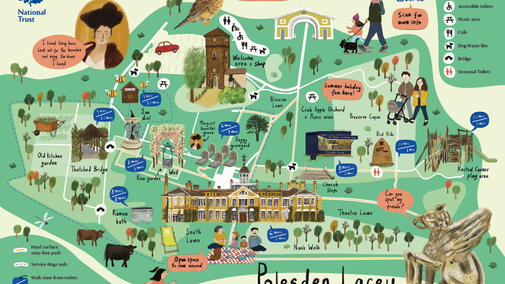
Polesden Lacey is a two pawprint rated place. Dogs are welcome in large parts of the garden and wider 1,600-acre estate at Polesden Lacey. Pick up a dog walkers’ leaflet when you arrive or download the guide before you visit.
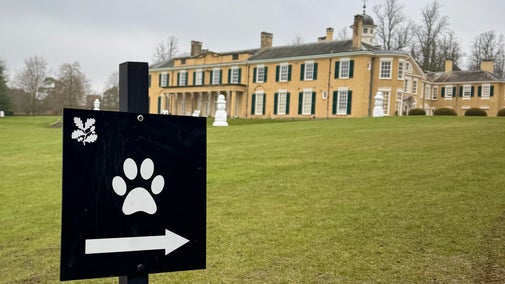
Discover everything you need to know about bringing your group to Polesden Lacey, including length of visit, prices and how to book.

Edwardian country retreat of socialite, Margaret Greville. The downstairs showrooms house her extensive collection of paintings, ceramics and fine French furniture. In 2026, there will be no exhibitions upstairs and so the floor will remain closed to the public. The team is working behind the scenes to create new interpretation about the history of the house and its treasures and to provide a new, free-flow route upstairs that will open in 2027. The ground floor will remain open as normal.
Highlights include exceptional views, the walled Rose Garden, double herbaceous borders and the Graham Stuart Thomas-inspired Winter Garden. You can also enjoy several short walks through and around Margaret Greville’s dog graves, a pocket of ancient woodland and our famous Long Walk and Nun’s Walk.
The 1,600-acre estate at Polesden Lacey boasts rolling downland with views over the Surrey Hills, ancient woodlands displaying glorious seasonal colour and wildlife habitats that are home to rare birds and butterflies.
A wonderful natural play area made using wood from the Polesden Lacey estate. Enjoy the swings, tunnels and giant nests as you embrace your inner animal and get closer to nature. The perfect place to have fun and spend time outdoors.
Coffee shop serving hot drinks, cakes and snacks to take away. Café offers a bigger menu with indoor and outdoor seating.
Retail outlet selling original gifts, local products and a gorgeous selection of plants - many that tie in with the varieties growing in the gardens at Polesden Lacey. A volunteer-run second-hand bookshop is available in the house.
Just to the right as you exit the house, why not take a moment to browse our excellent selection of pre-loved books in the Garden Room second-hand bookshop? We have a good selection of collectable and vintage books available to buy. If you are interested in looking at these books, please contact us on 01372 452048 for more information or to book an appointment.
Looking for a tranquil break in Surrey? At Polesden Lacey we have four holiday cottages on the estate. Garden Cottage, a spacious three-bedroom Regency-style villa with elegant décor, sits next to the Rose Garden and Vegetable Garden. Or, stay in one of our converted, dog-friendly barns, Yew Tree Barn or one of two Bagden Farm Cottage barns on the edge of the Polesden Lacey estate. The barns are warm and welcoming retreats with contemporary interiors and lovely views sleeping two to six people.
From 16 February to 15 March, the National Trust is celebrating the release of Disney and Pixar’s “Hoppers”, in Cinemas 6 March. Discover the ‘Hop into the wild’ family trail, with storytelling and outdoor play.

Join Senior Gardener, Janine for a free 45-minute talk in the Rose Garden at Polesden Lacey on Friday 6 March at 11am. No booking - spaces available on a first-come, first-served basis. Please collect a token from visitor reception on arrival.

This Easter, join Grizwald the Griffin for 'Grizwald's Easter Fest', a children's trail with activities themed around all the fun of a spring fete adventure. Trail runs daily from 21 March until 14 April. £3.50 per trail, includes trail sheet, bunny ears and a dairy or Free-From chocolate egg.

Visit Polesden Lacey six times between 19 January and 17 July (outside school holidays and weekends) to see different seasonal flowers coming into bloom around the garden and grounds. Collect six stamps (one per visit) to claim a limited edition Polesden in Bloom pin badge. You can pick up your free Polesden in Bloom passport from Visitor Reception. Scan your membership card or pay admission to receive a stamp. Stamps can only be collected on weekdays - excluding Easter school holidays (27 March-13 April), Bank Holidays (4 and 25 May) and May half term (25-31 May). Maximum of one stamp per day.
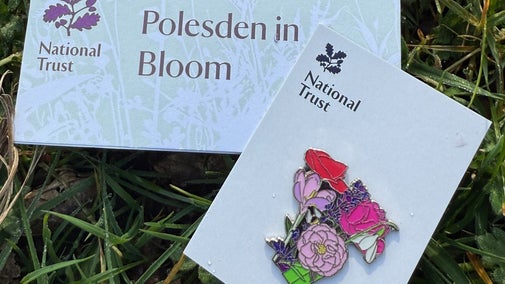
Polesden Lacey has always been a place for recreation and the tradition continues to this day. Four neatly manicured croquet lawn courts are available for public hire at weekends and on Bank Holidays from Saturday 4 April to the end of September. Courts must be booked in advance via tel. 01372452048 or email polesden.reception@nationaltrust.org.uk.
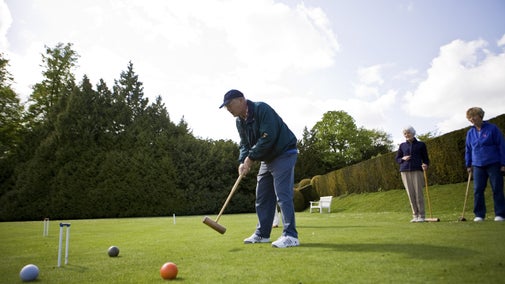
Discover the seasonal joys of Surrey this winter by bringing the family to Polesden Lacey. From family fun in the gardens to walks in the woods, there is plenty for all ages to see and do at this time of year.

The garden at Polesden Lacey has something to offer all year round. Take in the views over Ranmore Common from the South Lawn and indulge in the peace and quiet in the Old Kitchen Garden and Upper Sunken Garden. Or admire the seasonal colour of the Winter Garden. Our team is working hard to take the garden to new heights and ensure there is always something beautiful to enjoy.
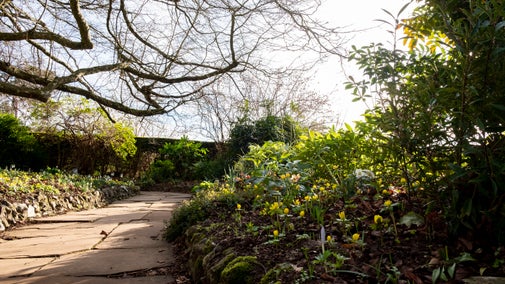
From stunning décor in the Gold Saloon to state-of-the-art conveniences, explore the ground floor of Margaret Greville's house at Polesden Lacey, a luxurious house fit for royalty.

Take a peaceful walk in the woodland and explore Polesden Lacey’s wonderfully diverse 1,600-acre estate to discover birds, wildlife and beautiful viewpoints.

Kestrel Corner is a natural play area made using wood from the Polesden Lacey estate. Enjoy the swings, tunnels and giant nests as you embrace your inner animal and get closer to nature.

Whether you want to grab a light meal, snack or hot drink, or browse beautiful gifts and local products - we've got plenty to tempt you at Polesden Lacey.


You’ll find gorgeous views over the Polesden Lacey estate and elegant interiors in this Regency-style villa.

A larch-clad barn in a peaceful spot on the Polesden Lacey Estate, with a contemporary interior and lovely views.

A modern, timber-framed barn with views to the Surrey hills.

A modern, timber-framed barn with views to the Surrey hills.
The estate at Polesden Lacey is home to a wide variety of butterflies. This modestly strenuous walk is perfect for walkers of any age and skill level. It takes approximately an hour and a half. Please note that Butterfly spotting is now limited due to cattle grazing in fields.
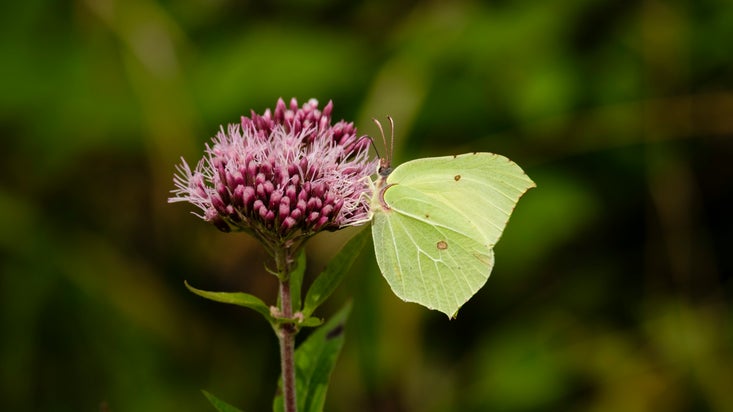
A social walk with a few steady inclines, this walk takes approximately an hour and takes in some of the best views from Polesden Lacey. Please note dogs are not allowed on this walk.
Hop into this self-guided outdoors adventure – with storytelling and play. Fun for all the family.
Have you ever wondered what it takes to look after the Rose Garden at Polesden Lacey? Join Senior Gardener, Janine for a free 45-minute talk in the Rose Garden on Friday 6 March at 11am.
Every Friday afternoon, take a moment to switch off and take in the surroundings in our dedicated Silent Space at Polesden Lacey.
To thank National Lottery players for supporting good causes, we’re offering free entry between 7 and 14 March for National Lottery Open Week on presentation of a lottery ticket, scratch card or proof of play online.
Join the Dog Walking Group on an energetic walk around the estate with your canine friend on the second Tuesday of the month.
Learn to take great photos with the help of our award-winning photographer. One-day workshops taking place at Polesden Lacey on selected dates throughout the year.
This Easter, join Grizwald the Griffin for 'Grizwald's Easter Fest', a children's trail with a spring fete theme and activities for all the family to enjoy.
In the Surrey Hills, just 25 miles from London, Polesden Lacey is ideal for spending time with family and friends. The genius of the garden is its setting with glorious views of Ranmore Common and rolling parkland. A landscape virtually unchanged since medieval times.
Daffodils fill the lawns in spring, whilst the summer highlights are the abundant Rose Garden and stunning herbaceous borders. Deckchairs on the South Lawn make it easy to take in the far-reaching views; perfect for picnics or grab a scoop of local dairy ice cream. Autumn offers golden colour across the landscape and from December the winter garden brings colour and fragrance.
The house was the weekend retreat of Margaret Greville. From brewer’s daughter to friend of Kings and Queens, the house is overflowing in rich social history. Remodelled by architects Mewès and Davis, hot off their successful refurbishment of the Ritz hotel, the house interiors are a showpiece in their own right, brimming with opulence and luxury. Margaret Greville was a wealthy and discerning collector of art and objects. In her lifetime, she amassed a surprisingly varied collection including Dutch and British Masters, Italian and Sicilian Maiolica and fine French furniture. Join a guided tour in the mornings, or wander through at your leisure in the afternoons.
Boasting a large shop and plant sales, there is bound to be something to inspire you from your visit.
Polesden Lacey, set amidst the Surrey Hills, is largely the creation of Margaret Greville in the early 20th century. Through inherited wealth and powerful connections, Margaret created a place of luxury and hospitality, with her significant art collections providing a suitably sumptuous backdrop .
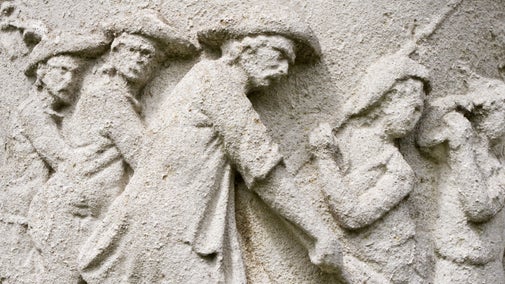
From her quiet childhood in Scotland, Margaret Greville climbed the social ladder to become one of the most popular socialites in the Edwardian era and owner of Polesden Lacey.

Discover some highlights of Polesden Lacey’s exceptional collection of paintings, created by Margaret Greville, the last owner of Polesden, and her father.

Search for live volunteering opportunities, or register your interest with Polesden Lacey.


Join today and help protect nature, beauty and history – for everyone, for ever. Enjoy access to more than 500 places with National Trust membership.
By sharing your email address you’re agreeing to receive marketing emails from the National Trust and confirm you’re 18 years old or over. Please see our for more information on how we look after your personal data.